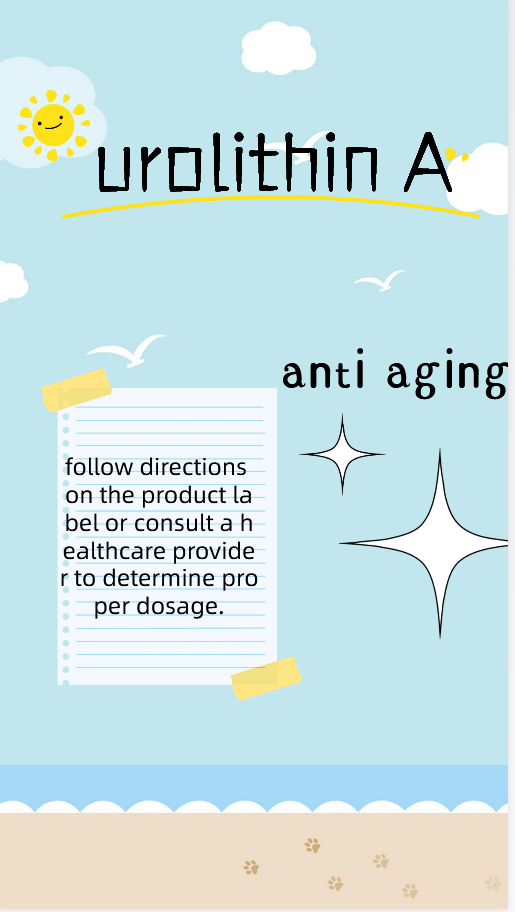Urolithin A is an exciting molecule in the field of anti aging research. Its ability to restore cellular function and improve health has been promising in animal studies. However, more research is needed to determine its effectiveness in humans.While we may not have discovered the fountain of youth, Urolithin A brings us closer to understanding the secrets of aging and potentially unlocking the key to a longer, healthier life.
Urolithin A is a natural compound that has received much attention in recent years due to its potential health benefits. Emerging research suggests that it may have anti-inflammatory, anti-cancer and anti-aging properties.
●Urolithin A is a metabolite produced by the breakdown of ellagitannins, a polyphenolic compound found in certain fruits and nuts. The conversion of ellagitannins to urolithin A occurs primarily in the gut due to the action of certain gut bacteria.
●Pomegranate is one of the richest sources of ellagitannins and thus urolithin A. The bright red arils, or seeds, of pomegranates contain high concentrations of ellagitannins, which are converted to urolithin A during digestion. Pomegranate juice and extracts are also good sources of urolithin A.
●Another fruit that contains urolithin A is raspberries. Like pomegranates, raspberries are rich in ellagitannins, especially in their seeds. Regular consumption of fresh or frozen raspberries might increase urolithin A levels in the body.
● Certain nuts, such as walnuts and pistachios, also contain trace amounts of urolithin A. Although urolithin A is found in lower amounts compared to fruits such as pomegranates, including these nuts in your diet can help increase your overall urolithin A intake.
While fresh fruit and nuts are excellent dietary sources of urolithin A, it's worth mentioning that urolithin A supplements are also available. These supplements can provide a convenient way to increase your urolithin A intake.
Urolithin A is a compound derived from a natural substance called ellagitannin, which is found in certain fruits such as pomegranates and berries. When we eat these fruits, our gut bacteria break down ellagitannins into urolithin A, allowing our bodies to benefit from this remarkable compound.
One of the most exciting discoveries about urolithin A is its ability to rejuvenate mitochondria, the powerhouses of our cells. As we age, our mitochondria become less efficient, leading to a decline in cellular energy production. Research has shown that urolithin A can activate a process called mitophagy, which clears out dysfunctional mitochondria and stimulates the production of new healthy ones. This process leads to improvements in energy production and overall cellular function.
Additionally, urolithin A has been found to enhance muscle health and strength. As we age, we tend to lose muscle mass, leading to weakness and reduced mobility. However, studies in older animals have shown that supplementation with urolithin A promotes muscle growth and prevents muscle wasting.
Another surprising benefit of Urolithin A is its protection against neurodegenerative diseases such as Alzheimer's and Parkinson's. These diseases are characterized by the accumulation of toxic proteins in the brain, leading to cognitive decline and movement disorders. Recent studies have shown that urolithin A can help remove these harmful proteins, reducing the risk and progression of these neurodegenerative diseases.
1. Eat foods rich in ellagitannins: To naturally increase urolithin levels, eating foods rich in ellagitannins is key. Pomegranates, strawberries, raspberries, and blackberries are excellent sources of ellagitannins. Including these fruits in your diet can boost urolithin production in your gut.
2. Optimizing Gut Health: Having a healthy gut microbiota is critical for urolithin production. To support a diverse and balanced gut microbiome, include fermented foods such as yogurt, kefir, sauerkraut, and kimchi in your diet. These foods introduce good bacteria to your gut, which boosts urolithin production.
3. Take urolithin supplements: In addition to dietary sources, urolithin supplements are also available in the market. These supplements provide concentrated doses of urolithins, which may be beneficial for those who have difficulty consuming adequate amounts of ellagitannin-rich foods on a regular basis or who have gut health issues.
4. Combine ellagitannins with fat sources: Ellagitannins are more easily absorbed by the body when eaten with healthy fat sources. Consider adding some nuts, seeds, or a little olive oil to the fruit to enhance the absorption of ellagitannins and increase urolithin production.
The time it takes for urolithin A to work varies with several factors. The most important factor is personal metabolism. Everyone's body processes substances differently, which also affects how quickly the body absorbs and uses urolithin A. In addition, the dose and form in which urolithin A is consumed can also affect the timing of its onset of action.
Studies have shown that consuming natural forms of urolithin A, such as pomegranate juice or certain berries, can produce detectable levels of the compound in the blood within hours. However, the effects of urolithin A may not be immediately apparent, as the compound's actions are more focused on long-term health benefits.
It is important to note that urolithin A is not a quick fix for any particular health condition. Instead, it is thought to exert its effects by activating a body cell recycling process called autophagy. This process involves breaking down and removing damaged cells and proteins, which can have long-term effects on overall health and well-being. Research is still ongoing as to how long it will take to discover the potential benefits of urolithin A.


Research on the side effects of urolithin A is still somewhat limited, as it is a relatively new field of research. Most studies conducted to date have focused on its positive effects rather than any adverse effects. Nonetheless, it is crucial to proceed with caution and understand the potential risks.
A possible problem with the use of urolithin A is that it may interact with certain medications. As a dietary supplement, it may interact with drugs metabolized by the same liver enzymes. This may change how effective or safe these medicines are. Therefore, it is important to consult a healthcare professional before taking urolithin A if you are taking any other medications.
Another aspect to consider is the dosage of urolithin A. Currently, there are no recommended daily intakes or specific dosage guidelines for this compound. Therefore, it is difficult to determine if there is an optimal dose, or if there are any potential side effects associated with higher doses. It is recommended to follow directions on the product label or consult a healthcare provider to determine proper dosage.
Post time: Jun-21-2023





